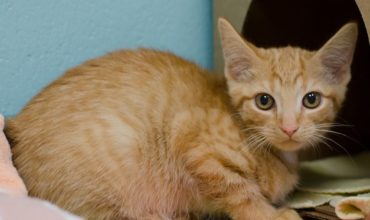It can be overwhelming when you come to the shelter looking for a cat or kitten to adopt. You may wonder what kind of feline will work best for your home, and how to tell which cat might fit that bill. Following a few general rules can help make that decision for you! Genetics, history, and socialization all play a part in who a kitten or cat is, or who they will be when they grow up. All cats have had different experiences throughout their lives that help shape who they are, so be prepared to offer lots of great
Read More
Archives for Pre-Adoption Information
Cost of Owning a Cat
When you think about the annual cost of care for your cat, there are several things to consider. Cats can live an average of 10-18 years, although some cats may even live into their twenties. Below are general price ranges for the things your cat will need over the course of his/her life. Food Most cats are fine with a typical feline pet food that you can buy at specialty pet stores or even grocery stores. It is important to pay attention to the ingredient list on your cat’s food because often times, you get what you pay for. If
Read More
Children and Dogs: Important information for Parents
[print-me] Living with a pet can be beneficial to children. Pets can enhance a child’s self-esteem, teach them responsibility and help them to learn empathy. However, children and dogs are not always going to automatically start off with a wonderful relationship. Parents must be willing to teach the dog and the child acceptable limits of behavior in order to make their interactions pleasant and safe. Selecting a Dog What age is best? Many people have a “warm fuzzy” image of a puppy and a child growing up together. If you have a young child and are thinking of adopting a
Read More
Adopting a Fearful Cat
[print-me] Why Are Some Cats Fearful? Fearful behavior in cats can be caused by various factors. Insufficient exposure to humans and/or a variety of stimuli during kitten hood as well as traumatizing events in their lives can teach them to react fearfully towards people or new situations. Cats can also be genetically predisposed to being fearful. How to Introduce a Fearful Cat to a New Home Fearful cats usually do best in relatively quiet homes. They are often not suitable for young children as children can easily scare them with loud noises or sudden movements. Many fearful cats slowly become
Read More
Adopting a Fearful Kitten
[print-me] What Does “Fearful” Mean? A fearful kitten is generally one that has not had full socialization. If a kitten does not have much contact with people when it is between the ages of 3 weeks and 7 weeks, it is likely to be scared of strangers it meets. Depending on the individual temperament of the kitten, what it has observed from its mother, and how old it is, it may hiss, spit or strike out – or may simply attempt to run away. Some fearful kittens learn to trust people quickly, others can take a long time. This depends
Read More
Selecting the right pet for you
[print-me] Puppies and kittens are babies. All babies are cute, cuddly and fun to watch whether they’re playing or sleeping. It’s wonderful to watch a baby grow, explore and learn. However, we can’t predict what kind of personality that baby will have as an adult. It’s impossible to look at the rows of human babies in a hospital nursery and know who will be athletic or academic, quiet or talkative, high or low energy, artistically or mechanically gifted, sociable or a “loner.” Many physical traits of certain types or breeds of dogs and cats can be fairly predictable. Some are good traits like size, coat and hair types, and some are bad, such as overbreeding, health problems and
Read More
Is now a good time to adopt a pet?
[print-me] Pets add fun, companionship and love to our lives, but they’re also a big responsibility. Choosing to add a pet to your family is a very important decision. Sometimes, adopting a pet may be too much added responsibility if you’re experiencing other life-changes at the same time. Take this quiz to assess what’s happening in your life now, and in the near future, to help you decide if this is the best time to adopt a pet. Check the following events that have either occurred in your life in the past six months, or that you think may occur in the coming six months: Divorce or end of a relationship Marriage Change in living arrangements (new roommates or moving in with significant other) Move to a new residence Pregnancy or new baby Longer hours or increased responsibility at work Financial concerns Children leaving home or moving back home Caretaking responsibilities for elderly or ill family member Significant changes in family routine Death of a family member Death or disappearance of a family pet Relinquishment of a pet (given away or brought to an animal shelter) Significant health problems of a family member Change in working status of a family member (begins work, changes jobs or retires) Frequent travel, either for business or pleasure Limited leisure or free time Graduation from high school or college Disagreement among family members about adopting a pet Add one point for every pet you currently have (one aquarium counts as one pet). Scoring 0-3: Your life seems fairly stable. Now is probably a reasonable time to acquire a pet. 4-6: You have a lot of responsibilities right now. Although adopting a pet may still work for you, a small mammal, an adult cat, or well-trained, adult dog would probably be more appropriate than a kitten, a puppy or an active breed of dog. 7-10: Let’s think twice about this. With all the changes and responsibilities in your life right now, you may not have time to care for a
Read More
Kitten-proofing your home
[print-me] When bringing a kitten home, there are a few easy steps that you can follow to keep your little bundle of fluff safe in their new environment. It’s best to take a look around before you bring your kitten home. The real secret to kitten-proofing is to look at your home through the eyes of a cat. Find everything that looks like a fun toy, and if it’s something harmful, get rid of it or make it safe. Having her home prepared for her arrival will make the transition much easier for all of you! Look around your house
Read More
Cost of Owning a Cat
[print-me] When you think about the annual cost of care for your cat, there are several things to consider. Cats can live an average of 10-18 years, although some cats may even live into their twenties. Below are general price ranges for the things your cat will need over the course of his/her life. Food Most cats are fine with a typical feline pet food that you can buy at specialty pet stores or even grocery stores. It is important to pay attention to the ingredient list on your cat’s food because often times, you get what you pay for.
Read More









